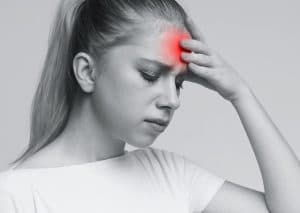 When you develop a headache that keeps recurring and getting worse, your oral health might not be the first thing you consider as the main cause of it. However, for people who experience TMJ disorder, chronic headaches and migraines can be just one of several symptoms that can be traced back to the malfunction in their jaw joints. Today, we examine what TMJ disorder can mean for your oral health and more, and how to determine if it’s the source of your chronic headaches and other pains.
When you develop a headache that keeps recurring and getting worse, your oral health might not be the first thing you consider as the main cause of it. However, for people who experience TMJ disorder, chronic headaches and migraines can be just one of several symptoms that can be traced back to the malfunction in their jaw joints. Today, we examine what TMJ disorder can mean for your oral health and more, and how to determine if it’s the source of your chronic headaches and other pains.
The implications of having TMJ disorder
TMJ (temporomandibular joint) disorder describes a dysfunction in one or both of your jaw joints. These joints are located on either side of your jaw and allow it to move as needed when you speak, bite, chew, and more. TMJ disorder develops when one or both of these joints are compromised in some way, such as the joint becoming damaged, inflamed, or misaligned. This can lead to a host of varying symptoms, from discomfort in your jaw joints to the formation of chronic headaches and, in some cases, more severe migraines.
Headaches and other TMJ symptoms
Having TMJ disorder means that one or both of your TMJs are unable to function properly whenever you open and close your jaw. The connection between this disruption and symptoms such as headaches lies in the nerve group that lies near each TMJ. Known as the trigeminal nerves, this group innervates most of your head, neck, and face. When they’re disturbed by a malfunctioning TMJ nearby, the aggravation can lead to aches and pains throughout these areas, including causing you to experience recurring and increasingly worse headaches. This can also lead to symptoms such as pain and ringing in your ears, sore muscles in your neck and shoulders, and more.
Alleviating your TMJ symptoms
When you develop TMJ disorder, the dysfunction in your jaw joints will continue to cause problems until it’s addressed. This means finding relief from your chronic headaches or migraines could require visiting your dentist to thoroughly diagnose your TMJ disorder and help you find the most appropriate treatment for it. For example, in many cases, the dysfunction and its symptoms can be alleviated with help from a custom-designed TMJ appliance. Similar to a mouthguard, but smaller and more comfortable, a TMJ appliance can help your jaw rest more comfortably and relieve excess pressure on your jaw joints, reducing or eliminating the symptoms related to the dysfunction.
Learn if TMJ treatment can help you
If you suffer from chronic headaches along with one or more other aches and pains, then you may be a candidate for TMJ disorder treatment. To learn more, schedule a consultation by calling the Dental Centre of Conroe in Conroe, TX, today at (936) 441-4600.


